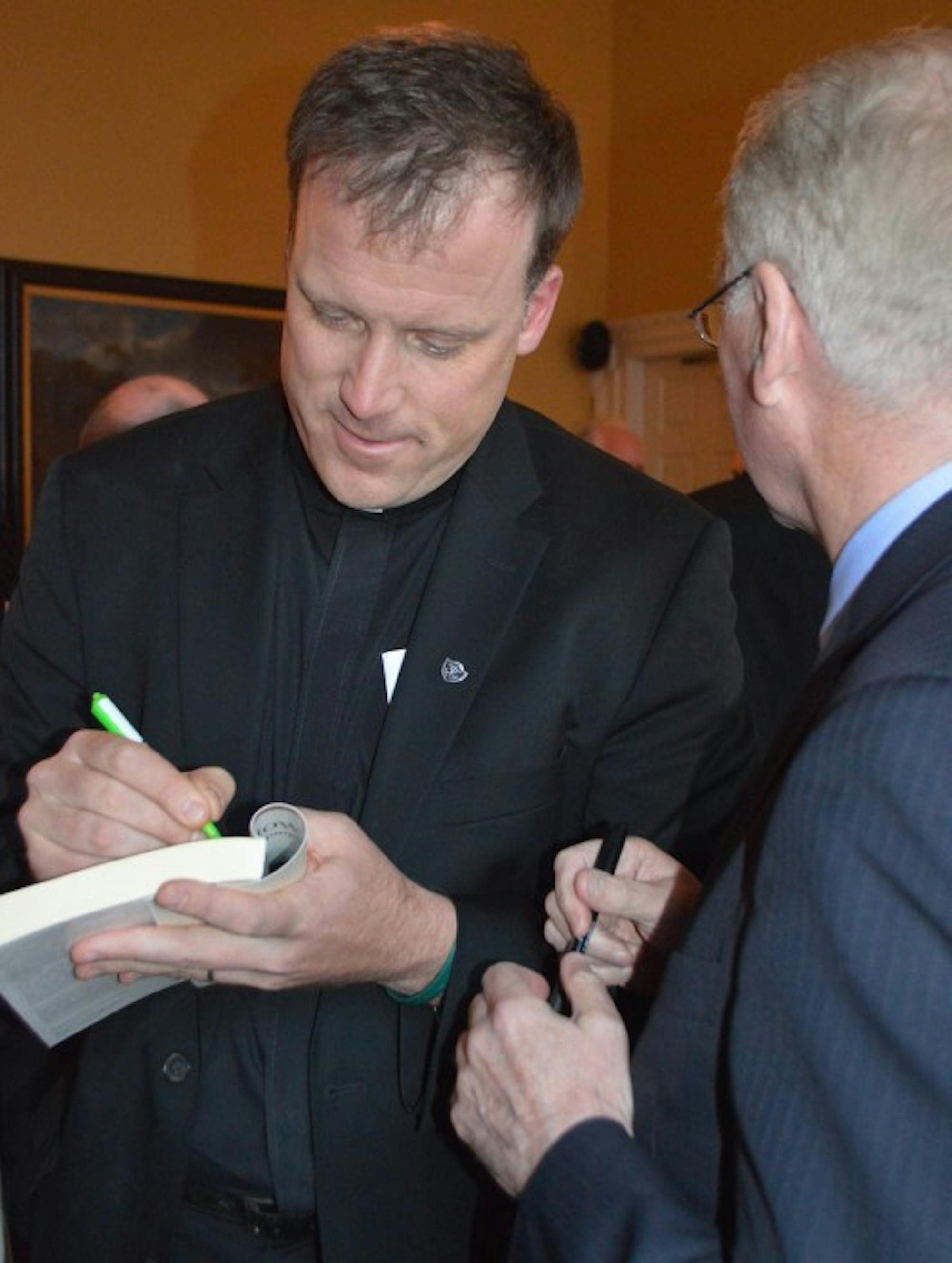DUBLIN — Surrounded by notable priests, politicians and members of the Notre Dame community at the historic Merrion Hotel in Ireland’s capital, professor of political science Fr. Sean McGraw launched his new book, ‘How Parties Win: Shaping the Irish Political Arena' on Thursday evening.
The book, McGraw’s first, stems from his doctoral research dating back to 2006, he said.
“It’s been a long time coming because I began my doctoral research back here [in Dublin] in 2006 and 2007 when I lived here and had a Fulbright [Scholarship] at University College Dublin and worked out of O’Connell House,” McGraw said in an interview. “I followed a lot of politicians around during the 2007 election, and that’s really when I did the heart of my initial research, and then have done several rounds of research from that.

“In 2010 and 2012, I did parliamentary surveys where I interviewed nearly two-thirds of the Irish parliament. So I’ve been kind of building on my initial research since back in 2006, so it’s been a long time coming. It feels good to actually have it done.”
The book also launched in the United States last Tuesday, St. Patrick’s Day, at an event on Notre Dame’s campus that featured former Irish President and current Keough-Naughton Institute for Irish Studies visiting fellow Mary McAleese.
Thursday’s event brought together important figures in Irish politics and society, including Apostolic Nuncio to Ireland Charles John Brown, who received his undergraduate degree from Notre Dame, Irish businessman Fergal Naughton, who serves on the Notre Dame Board of Trustees and current and former Irish legislators and members of government.
McGraw encountered many of these politicians during the course of his research and said his experiences working on the book showed him the hard working reality of Irish political life.
“The politicians [in Ireland] take a bad wrap, I think, as politicians do in many places, but they are really hard working, and they’re almost hyper representative in responding to the needs of their constituents, maybe to a fault,” he said. “But it was pretty remarkable to see how hard they work and literally knock on doors with them and go into peoples’ homes with them and to see how responsive they are.”
Some of these politicians who read earlier drafts of McGraw’s book have given him positive reviews, he said.
“Thankfully, the few politicians who have read it already in earlier drafts have given me good feedback,” McGraw said. “Mary McAleese … used the image that it was as if I gave her my hand and walked her through a period of her life that she lived through and showed her things that she hadn’t seen before, which was a great compliment because in some ways, I’m an outsider, so to be able to have them say that you’re an insider is really a great honor.”
McGraw said his research for the book led to several basic conclusions “about how major political parties adapt to huge socioeconomic change.”
“I think the main thing that’s different in my approach than in many others is that I try to look at multiple dimensions and I look at competition over time,” he said. “So a lot of studies look at one election and make a lot of that, and my point is actually you have to look at how parties adapt over a series of elections, and that’s really what matters.
“The other thing is I come up with this idea of what I call ‘displacing issues.’ In Ireland they have referenda and all kinds of other institutional bodies that deal with issues that I think in some ways some people look at as a bad thing because they feel like politicians are punting. But in some ways it reduces tension and creates consensus, and that’s not such a bad thing, especially if you look at what we’re experiencing in the U.S. or other places where there’s such intense polarization.”
In his remarks at the event, McGraw thanked the politicians and academics he worked with throughout his research, and also the friends who he said have helped make Ireland his home.
“One of the first times I came to Ireland, I heard the phrase, ‘Home is the place you always have to go back to and they always have to take you,’ and for me, that’s the way I think about Ireland ... that it’s my home.” McGraw said. “And even though for many people I encounter, I am just one of these yanks and I’m an outsider, in some ways, my time over the last really 20 years of coming to Ireland has been one of shifting from, hopefully, being an outsider to one of being an insider.”
In an interview before the event, McGraw, who said he hopes his second book will focus on “the collapse of the institutional Church in Irish society,” also expressed his gratitude to the Notre Dame undergraduate students who have worked with him over the course of his research for the book.
“I’ve been very fortunate to have students working with me over the last five years,” he said. “When I was here as a doctoral student, I had students who were at the Trinity and [University College Dublin] program who literally helped me look through newspapers and went to elections with me. One of the exciting to me all along is that Notre Dame undergrads have been hugely helpful to me in my research, and that’s also made it more fun.”













